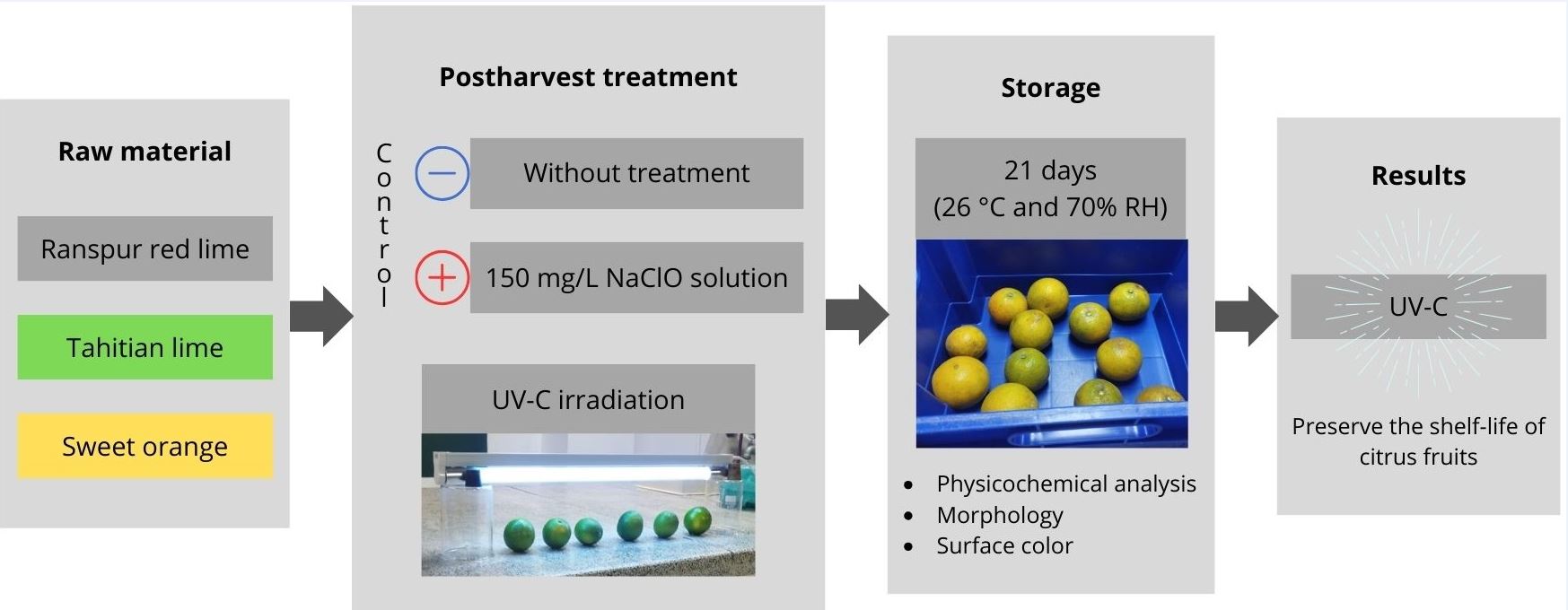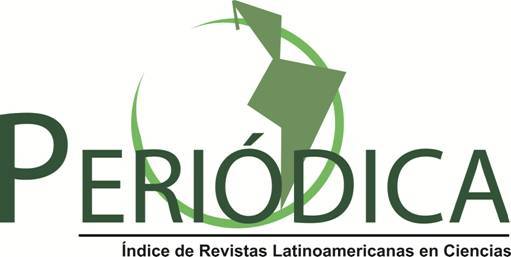Effect of UV-C on postharvest quality of citrus fruits from the northeastern region of Valle del Cauca, Colombia
DOI:
https://doi.org/10.18633/biotecnia.v26.2303Keywords:
Fruit irradiation, Ultraviolet short wave, Storage at room temperature, Physicochemical analyses, Color measurementAbstract
Ultraviolet short wave (UV-C) irradiation is an emerging technology employed in postharvest fruits treatment. This method facilitates a reduction in microbial load, triggers an elicitor effect, and prolongs the shelf life of fruits. In this study, UV-C was applied to rangpur red lime, Tahitian lime, and sweet orange cv. 'Sweety,' which are the primary citrus varieties cultivated in the northeastern region of Valle del Cauca, Colombia. The citrus fruits were exposed to UV-C irradiation for 5 min using a lamp positioned 11 cm above the work area. Subsequently, the fruits were stored in plastic baskets for 21 days at 26 °C with a relative humidity of 70%. Positive and negative control treatments were also implemented. The positive treatment involved samples treated with a 150 mg/L sodium hypochlorite solution for 5 min, while the negative treatment comprised samples without any postharvest treatment. The results revealed that UV-C application effectively delayed maturation, prevented granulation, and maintained the physicochemical parameters, morphology, and surface color of citrus fruits. In conclusion, UV-C shows promise as a technology for treating citrus fruits during the postharvest stage, offering a means to mitigate losses, and assuring food availability.
Downloads
References
AOAC. 2012. Official Methods of Analysis. 19th ed. Association of Official Analytical Chemists. Gaithersburg.
Asencio, A.D., Serrano, M., García-Martínez, S. and Pretel, M.T. 2018. Organic acids, sugars, anti-oxidant activity, sensorial and other fruit characteristics of nine traditional Spanish Citrus fruits. European Food Research and Technology. 244: 1497-1508.
Barreto, T.A., Andrade, S.C.A, Maciel, J.F., Arcanjo, N.M.O., Madruga, M.S., Meireles, B., Cordeiro, Â.M.T., Souza, E.L. and Magnani, M. 2016. A chitosan coating containing essential oil from Origanum vulgare L. to control postharvest mold infections and keep the quality of cherry tomato fruit. Frontiers in Microbiology. 7:1724.
Batista-Silva, W., Nascimento, V.L., Medeiros, D.B., Nunes-Nesi, A., Ribeiro, D.M., Zsögön, A. and Araújo, W.L. 2018. Modifications in organic acid profiles during fruit development and ripening: correlation or causation? Frontiers in Plant Science. 9: 1689.
Burdon, J., Lallu, N., Yearsley, C., Osman, S., Billing, D. and Boldingh, H. 2007. Postharvest condi-tioning of Satsuma mandarins for reduction of acidity and skin puffiness. Postharvest Biology and Technology. 43: 102-114, 1.
Castillejo, N., Martínez-Zamora, L. and Artés-Hernández, F. 2022. Postharvest UV radiation enhanced biosynthesis of flavonoids and carotenes in bell peppers. Postharvest Biology and Technology. 184: 111774.
El Guilli, M., Hamza, A., Clément, C., Ibriz, M. and Ait Barka, E. (2016). Effectiveness of postharvest treatment with chitosan to control citrus green mold. Agriculture. 6: 12, 2.
Estadísticas Agropecuarias. [Retrieved 3 April 2024] 2024. Available in: https://www.agronet.gov.co/estadistica/Paginas/home.aspx
Garzón-García, A.M., Ruiz-Cruz, S., Dussán-Sarria, S., Hleap-Zapata, J.I., Márquez-Ríos, E., Del-Toro-Sánchez, C., Tapia-Hernández, J.A., Canizales-Rodríguez, D.F. and Ocaño-Higuera, V.M. 2023. Effect of UV-C postharvest disinfection on the quality of fresh-cut ‘Tommy Atkins’ mango. Polish Journal of Food and Nutrition Sciences. 73: 39-49, 1.
Garzón-García, A.M., Ruiz-Cruz, S., Márquez-Ríos, E., Dussán-Sarria, S., Hleap-Zapata, J.I. and Lo-batón, H.F. 2020. Computational fluid dynamics as a technique for the UV-C light dose deter-mination in horticultural products. Biotecnia. 22: 84-92, 1.
Hu, L., Yang, C., Zhang, L., Feng, J. and Xi, W. 2019. Effect of Light-Emitting Diodes and Ultraviolet Irradiation on the Soluble Sugar, Organic Acid, and Carotenoid Content of Postharvest Sweet Oranges (Citrus sinensis (L.) Osbeck). Molecules. 24: 3440, 19.
Iturralde-García, R. D., Cinco-Moroyoqui, F. J., Martínez-Cruz, O., Ruiz-Cruz, S., Wong-Corral, F. J., Borboa-Flores, J., Cornejo-Ramírez, Y.I., Bernal-Mercado and A.T. Del-Toro-Sánchez, C. L. 2022. Emerging technologies for prolonging fresh-cut fruits’ quality and safety during storage. Horticulturae. 8: 731, 8.
Johari, N.H.F., Dolhaji, N.H., Shamsuri, S. and Latif, P.A. 2023. A Review on Sugar and Organic Profiles on the Postharvest Quality of Fruits. Science Letters. 17: 91-108, 2.
Kadluczka, D. and Grzebelus, E. 2022. Comparative fruit morphology and anatomy of wild relatives of carrot (Daucus, Apiaceae). Agriculture. 12: 2104, 12.
Lacerna, M.M. and Bayogan, E.V. 2018. Rind color change and granulation in pummelo [Citrus maxima (Burm. ex Rumph.) Merr.] fruit as influenced by 1-methylcyclopropene. International Food Research Journal. 25: 1483-1488, 4.
Lado, J., Alós, E., Manzi, M., Cronje, P.J., Gómez-Cadenas, A., Rodrigo, M. J. and Zacarías, L. 2019. Light regulation of carotenoid biosynthesis in the peel of mandarin and sweet orange fruits. Frontiers in Plant Science. 10: 1288.
Liao, L., Dong, T., Qiu, X., Rong, Y., Wang, Z. and Zhu, J. 2019. Nitrogen nutrition is a key modulator of the sugar and organic acid content in citrus fruit. PLoS ONE. 14: e0223356, 10.
Lufu, R., Ambaw, A. and Opara, U. L. 2020. Water loss of fresh fruit: Influencing pre-harvest, harvest and postharvest factors. Scientia Horticulturae. 272: 109519.
Lv, X., Zhao, S., Ning, Z., Zeng, H., Shu, Y., Tao, O., Xiao, C., Cheng, L. and Liu, Y. 2015. Citrus fruits as a treasure trove of active natural metabolites that potentially provide benefits for human health. Chemistry Central Journal. 9: 1-14.
Miller, B.A., Kostick, S.A., and Luby, J.J. 2022. Large-effect QTLs for titratable acidity and soluble solids content validated in ‘Honeycrisp’-derived apple germplasm. Agronomy. 12: 1703, 7.
Mishra, V., Abrol, G.S. and Dubey, N. 2018. Sodium and calcium hypochlorite as postharvest disin-fectants for fruits and vegetables. In Postharvest disinfection of fruits and vegetables. M.W. Sid-diqui (ed.), pp. 253-272. Academic Press, Sabour.
Pan, Y. and Zu, H. 2012. Effect of UV-C radiation on the quality of fresh-cut pineapples. Procedia Engineering. 37: 113-119.
Pathare, P.B., Opara, U.L. and Al-Said, F.AJ. 2013. Colour measurement and analysis in fresh and processed foods: A review. Food Bioprocess Technology. 6: 36-60.
Peralta-Ruiz, Y., Grande Tovar C.D., Sinning-Mangonez, A., Coronell, E.A., Marino, M.F. and Chavez-Lopez, C. Polymers. 12: 1822, 8.
Pereira Gonzatto, M. and Scherer Santos, J. 2023. Introductory Chapter: World Citrus Production and Research. In Citrus Research-Horticultural and Human Health Aspects. M. Pereira Gonzatto and J. Scherer Santos, pp. 97. IntechOpen.
Productores de viveros de cítricos en el Valle del Cauca se capacitan en normatividad del ICA para registrar sus predios. [Retrieved 3 April 2024] 2019. Available in: https://www.ica.gov.co/noticias/productores-de-viveros-de-citricos-en-el-valle-del
Rodriguez-Amaya, D.B. 2019. Update on natural food pigments-A mini-review on carotenoids, an-thocyanins, and betalains. Food Research International. 124: 200-205.
Sapers, G.M. 2014. Disinfection of contaminated produce with conventional washing and sanitizing technology. In The Produce Contamination Problem: Cases and Solutions. K.R. Matthews, G.M. Sapers and C. P. Gerba (ed.), pp. 389-431. Academic Press, San Diego.
Sharma, R.R., Singh, R. and Saxena, S.K. 2006. Characteristics of citrus fruits in relation to granula-tion. Scientia Horticulturae. 111: 91-96, 1.
Shen, Y., Sun, Y., Qiao, L., Chen, J., Liu, D. and Ye, X. 2013. Effect of UV-C treatments on phenolic compounds and antioxidant capacity of minimally processed Satsuma mandarin during refriger-ated storage. Postharvest Biology and Technology. 76: 50-57.
Sonntag, F., Liu, H. and Neugart, S. 2023. Nutritional and physiological effects of postharvest UV radiation on vegetables: A review. Journal of Agricultural and Food Chemistry. 71: 9951-9972, 26.
Sun, S.H., Kim, S.J., Kwak, S.J. and Yoon, K.S. 2012. Efficacy of sodium hypochlorite and acidified sodium chlorite in preventing browning and microbial growth on fresh-cut produce. Preventive Nutrition and Food Science. 17: 210-216, 3.

Downloads
Additional Files
Published
How to Cite
Issue
Section
License
Copyright (c) 2023

This work is licensed under a Creative Commons Attribution-NonCommercial-ShareAlike 4.0 International License.
The journal Biotecnia is licensed under the Attribution-NonCommercial-ShareAlike 4.0 International (CC BY-NC-SA 4.0) license.




_(1)_(1).png)






_(2).jpg)





